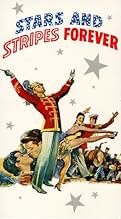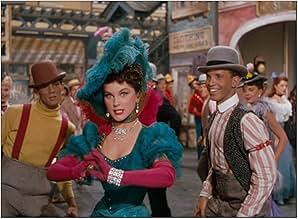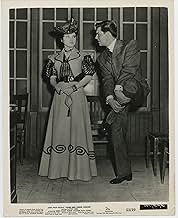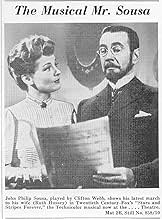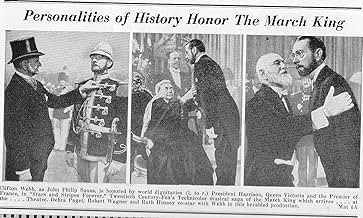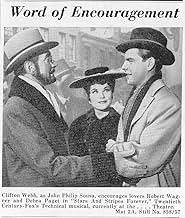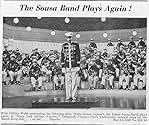IMDb RATING
7.1/10
1K
YOUR RATING
A film biography of the composer John Philip Sousa, from his early days in the Marine Corps Band through the Spanish-American War in 1898.A film biography of the composer John Philip Sousa, from his early days in the Marine Corps Band through the Spanish-American War in 1898.A film biography of the composer John Philip Sousa, from his early days in the Marine Corps Band through the Spanish-American War in 1898.
- Director
- Writers
- Stars
- Awards
- 3 nominations total
Thomas Browne Henry
- David Blakely
- (as Tom Browne Henry)
Frank Ferguson
- Mr. Wells
- (scenes deleted)
Aladdin
- Orchestra Conductor
- (uncredited)
- …
Bill Alcorn
- Specialty Dancer
- (uncredited)
Sharon Jan Altman
- Helen Sousa
- (uncredited)
Jon Andrews
- Minor Role
- (uncredited)
John Baer
- Chorus Boy at 'El Capitan' Rehearsal
- (uncredited)
Barbara Bailey
- Dancer
- (uncredited)
Patricia Barker
- Minor Role
- (uncredited)
Alvin Beam
- Minor Role
- (uncredited)
Bobker Ben Ali
- Reporter
- (uncredited)
- Director
- Writers
- All cast & crew
- Production, box office & more at IMDbPro
Featured reviews
What should be understood is that Stars and Stripes Forever is in no way a full biography of the famous March King which was the nickname given to John Philip Sousa. It is rather a portrait of the era known as the Gay Nineties in America where Sousa first achieved his reputation and prominence. Also included is a romance between fictional characters played by Robert Wagner and Debra Paget.
In that beard with those pince nez glasses, Clifton Webb looks remarkably like John Philip Sousa in that period and by reputation, Sousa was as much a dilettante as Webb normally played on screen which made him perfect casting. After leaving the Marine Corps band, Sousa formed his own orchestra which became world famous and toured the globe well into the Twenties.
But our story concerns Sousa the March King. Though he composed all kinds of music, it is his marches that have come down today and have given him his reputation. The Marine Corps official march, Semper Fidelis, was composed by Sousa and the incident involving President Benjamin Harrison as depicted in Stars and Stripes Forever is somewhat true. The Marine Corps Band was playing at a White House reception and the Harrison who was not the most social of presidents ordered Sousa to speed up the tempo so the receiving line would move at a brisk pace.
Ruth Hussey is cast in the Myrna Loy type role of the perfect understanding mate for her genius husband and she fulfills the role admirably. Even Clifton Webb does make you forget you're watching Clifton Webb and you do think you are seeing the real Sousa.
Stars and Stripes Forever is an admirable film and of course the finale does have several bands and marching armed forces personnel playing and marching to Sousa's most famous composition.
In that beard with those pince nez glasses, Clifton Webb looks remarkably like John Philip Sousa in that period and by reputation, Sousa was as much a dilettante as Webb normally played on screen which made him perfect casting. After leaving the Marine Corps band, Sousa formed his own orchestra which became world famous and toured the globe well into the Twenties.
But our story concerns Sousa the March King. Though he composed all kinds of music, it is his marches that have come down today and have given him his reputation. The Marine Corps official march, Semper Fidelis, was composed by Sousa and the incident involving President Benjamin Harrison as depicted in Stars and Stripes Forever is somewhat true. The Marine Corps Band was playing at a White House reception and the Harrison who was not the most social of presidents ordered Sousa to speed up the tempo so the receiving line would move at a brisk pace.
Ruth Hussey is cast in the Myrna Loy type role of the perfect understanding mate for her genius husband and she fulfills the role admirably. Even Clifton Webb does make you forget you're watching Clifton Webb and you do think you are seeing the real Sousa.
Stars and Stripes Forever is an admirable film and of course the finale does have several bands and marching armed forces personnel playing and marching to Sousa's most famous composition.
10lawprof
John Philip Sousa was not only America's "March King," he was a skilled organizer and entertainer who also composed much music now thoroughly unknown to most Americans (and fans elsewhere). His life spanned the era of an optimistic, brash America where live music was the only music to the burgeoning and eventually triumphant victory of an insatiable technology that even in Sousa's lifetime was employed to record almost everything. Sousa benefited from the new world of recording and he can be heard on compact disc in his later years conducting his famed quasi-military band.
20th Century Fox enlisted a cadre of fine performers for a seamlessly entertaining biopic of John Philip Sousa with a nice, anachronistically innocent, fictional romance interwoven with the band leader/composer's story.
As Sousa Clifton Webb brings to life a character who was, as in reality, ambitious and driven to succeed. Sousa left the Marine Corps, where he led The President's Own, to start his hand-picked band. In uniforms which the leader designed, the outfit mirrored great military bands (of which the U.S., as opposed to England, had a clear shortage during Sousa's life). Sousa understood the importance of touring and he was light years ahead of the twentieth century's pops ensembles in making his musicians - and his music - as ubiquitous as travel of his day allowed.
Sousa's patient and adoring wife, Jennie, is well played by Ruth Hussey.
A nice romantic plot is the courtship of aspiring singer Lily Becker and the alleged inventor of the sousaphone, Willie Little. Lily is the gorgeous Debra Paget and Willie the young and upcoming Robert Wagner. Neither character existed in real life but their romance is well threaded into Sousa's story and is coyly affecting.
1952 was a hard year for many Americans. A self-designated lame duck president presided over an unpopular war, the first in our history in which victory in the traditional military sense wasn't a strategic or political objective. "The Stars and Stripes Forever" was a refreshing patriotic film that didn't require thinking about the realities of the day. I remember seeing it as a kid and loving every minute. I still watch it occasionally.
Credit also goes to the producer and to director Henry Koster for including a scene at an Atlanta festival where a black chorus sings The Battle Hymn of the Republic under Sousa's baton right after a rousing version of Dixie was performed. This was two years before Brown v. Board of Education, the Supreme Court's belated start of the final assault on the obscenity of legalized racial discrimination. I doubt everyone in the South felt good about that scene.
Musical pieces are well interwoven with the story and the final minutes have Sousa's most famous march, also the movie's title, played with a segue from his band to contemporary marching marines and soldiers. His superimposed spectral leading is a fine reminder of his role. A very nice touch.
Folks who only know Sousa from a relative handful of oft-performed and wonderful marches should check out his less well-known music. NAXOS is currently releasing a series of CDs of works that reflect Sousa's extraordinary creativity. But above all, Americans owe him an everlasting debt for composing stirring music that still animates listeners as it did when first performed under his baton.
10/10
20th Century Fox enlisted a cadre of fine performers for a seamlessly entertaining biopic of John Philip Sousa with a nice, anachronistically innocent, fictional romance interwoven with the band leader/composer's story.
As Sousa Clifton Webb brings to life a character who was, as in reality, ambitious and driven to succeed. Sousa left the Marine Corps, where he led The President's Own, to start his hand-picked band. In uniforms which the leader designed, the outfit mirrored great military bands (of which the U.S., as opposed to England, had a clear shortage during Sousa's life). Sousa understood the importance of touring and he was light years ahead of the twentieth century's pops ensembles in making his musicians - and his music - as ubiquitous as travel of his day allowed.
Sousa's patient and adoring wife, Jennie, is well played by Ruth Hussey.
A nice romantic plot is the courtship of aspiring singer Lily Becker and the alleged inventor of the sousaphone, Willie Little. Lily is the gorgeous Debra Paget and Willie the young and upcoming Robert Wagner. Neither character existed in real life but their romance is well threaded into Sousa's story and is coyly affecting.
1952 was a hard year for many Americans. A self-designated lame duck president presided over an unpopular war, the first in our history in which victory in the traditional military sense wasn't a strategic or political objective. "The Stars and Stripes Forever" was a refreshing patriotic film that didn't require thinking about the realities of the day. I remember seeing it as a kid and loving every minute. I still watch it occasionally.
Credit also goes to the producer and to director Henry Koster for including a scene at an Atlanta festival where a black chorus sings The Battle Hymn of the Republic under Sousa's baton right after a rousing version of Dixie was performed. This was two years before Brown v. Board of Education, the Supreme Court's belated start of the final assault on the obscenity of legalized racial discrimination. I doubt everyone in the South felt good about that scene.
Musical pieces are well interwoven with the story and the final minutes have Sousa's most famous march, also the movie's title, played with a segue from his band to contemporary marching marines and soldiers. His superimposed spectral leading is a fine reminder of his role. A very nice touch.
Folks who only know Sousa from a relative handful of oft-performed and wonderful marches should check out his less well-known music. NAXOS is currently releasing a series of CDs of works that reflect Sousa's extraordinary creativity. But above all, Americans owe him an everlasting debt for composing stirring music that still animates listeners as it did when first performed under his baton.
10/10
Watch this movie to get a historical perspective on some of America's and the World's Best Marching Band Music by John Philip Sousa!
The film is a chronology of snippets about the life of John Philip Sousa, his wife, and two apparently fictional friends written into the movie to have a young romantic sub-plot. All other performers in this film are not interesting enough in character to comment upon. Most of the actors were not even credited in the films running credits.
Clifton Webb (real name: Webb Parmalee Hollenbeck) was 63 years old when this movie was released in 1952. While his written dialog is not all that dramatic, Mr. Webb was a long time actor, singer, dancer, silent screen performer and theater performer before making this picture. Clifton Webb doesn't really have to act in this film. He carries the part of John Philip Sousa by standing straight with a stiff back, wearing many colorful marching band uniforms, looking very snobbishly "British" with a stiff demeanor while putting on the airs of a musical task-master demanding perfection, yet with a silent softness in his heart for the two younger performers, a 22 year old Robert (John) Wagner and the vivacious, effervescent, and energetic 18 year old Debra Paget (real name: Debralee Griffin). Mr. Webb died in 1966 at the age of 77 years old.
Ruth (Carol) Hussy at age 38 years plays Sousa's wife "Jennie" Sousa. Research reveals that Sousa's wife's name was Jane van Middlesworth Bellis whom Sousa met during rehearsals for a stage play she was performing in. They married when he was 25 years old. Ms. Hussy portrays the role of a wife and homemaker who runs the Sousa household and cajoles her husband to be sympathetic to the secret romance of Willie Little and Lily Becker. She is the `binder' of the Sousa household and the `understanding' wife behind the scenes.
Internet research reveals no existence of the two characters, Little and Becker, in real life. A web site of the Dallas Wind Symphony has a listing of every band member who performed in Sousa's Band. The name of Willie Little is not listed among them. The movie explains that Willie Little is a Marine Private who joins the Corps with the desire to perform in Sousa's Band. The Little character comes to Sousa's home, unannounced, with a Sousaphone Little claims to have "invented" and had built for Sousa's march music to make the sound better than a standard tuba which is too brash a sound for a concert hall. Sousa takes a liking to Private Little and takes him into his band. However, Sousa himself gave a personal interview to the Christian Science Monitor on May 30, 1922 and claims that he, Sousa, approached the J.W. Pepper Company in Philadelphia and commissioned the Sousaphone to be made in 1893, one year after Sousa gives up his directorship of the Marine Band.
Debra Paget, best known for her part four years later as the beautiful `Lilia the Water Girl' in the epic The Ten Commandments, gives this film all the levity of young romance and a love tension which the mature Webb-Hussy parts can not produce. It is a pleasure to watch her dance and sing numbers as well as the way she gives Robert Wagner "love kicks" in the shins. At the age of 28 years Ms. Paget married for the third time and quit the motion picture business. A loss to all whom appreciates a beautiful woman!
When the battleship USS Maine is blown up in Havana Harbor on February 15, 1898 Willie Little re-enlists in the Marines and goes off to Cuba to fight in the four month Spanish-American War of 1898. He loses a leg and returns home to his "secret wife" Lily and a seat at a Sousa concert to entertain the hospital patients in Washington, D.C.
Historical data from various web sites highlight that John Philip Sousa was placed into the Marine Corps in 1867 at the age 13 years as an apprentice musician, by his father, John Antonio Sousa, who was a trombonist in the Marine Corps band, because young Sousa wanted to run away to join the circus. Eight years later, Sousa was discharged from the Marines (1875) at the age of 21 years. In the next five years Sousa builds a reputation good enough for the Marines to contact him and offer him the Directorship of the Marine Band. Sousa returns to the Corps and accepts the Directorship in 1880. Sousa is 26 years old and is now being referred to as a Sergeant Major (however his uniforms display no marine enlisted rank) until he departs the Marines at age 38 years (1892) to form his own civilian marching band because he cannot afford to support his family of wife and four children on Marine pay. Real photos of Sousa show him with a thick dark beard, which makes it believable, that the 63-year-old Webb can play the 38-year-old Sousa during the Marine years.
Watch this movie to get a good dose of the famous Sousa marches, Semper Fidelis (1888) the Official Marine Corps Hymn, Washington Post March (1889), and the Stars and Stripes Forever (1896) the Official March of the United States. You will even enjoy the band's playing of the song, Dixie as well as the inspiring gospel choir performing the Battle Hymn of the Republic when Sousa's Band marches into Atlanta after their commission to perform at a convention was canceled. If you like pretty, late-19th Century, dresses and snappy military band uniforms this is a movie to see. No one else could play John Philip Sousa but Clifton Webb. And, next Fourth of July when you see the Boston Pops Playing The Stars and Stripes Forever you will have some historical background into the world of the man who composed this enduring Spirit of America.
The film is a chronology of snippets about the life of John Philip Sousa, his wife, and two apparently fictional friends written into the movie to have a young romantic sub-plot. All other performers in this film are not interesting enough in character to comment upon. Most of the actors were not even credited in the films running credits.
Clifton Webb (real name: Webb Parmalee Hollenbeck) was 63 years old when this movie was released in 1952. While his written dialog is not all that dramatic, Mr. Webb was a long time actor, singer, dancer, silent screen performer and theater performer before making this picture. Clifton Webb doesn't really have to act in this film. He carries the part of John Philip Sousa by standing straight with a stiff back, wearing many colorful marching band uniforms, looking very snobbishly "British" with a stiff demeanor while putting on the airs of a musical task-master demanding perfection, yet with a silent softness in his heart for the two younger performers, a 22 year old Robert (John) Wagner and the vivacious, effervescent, and energetic 18 year old Debra Paget (real name: Debralee Griffin). Mr. Webb died in 1966 at the age of 77 years old.
Ruth (Carol) Hussy at age 38 years plays Sousa's wife "Jennie" Sousa. Research reveals that Sousa's wife's name was Jane van Middlesworth Bellis whom Sousa met during rehearsals for a stage play she was performing in. They married when he was 25 years old. Ms. Hussy portrays the role of a wife and homemaker who runs the Sousa household and cajoles her husband to be sympathetic to the secret romance of Willie Little and Lily Becker. She is the `binder' of the Sousa household and the `understanding' wife behind the scenes.
Internet research reveals no existence of the two characters, Little and Becker, in real life. A web site of the Dallas Wind Symphony has a listing of every band member who performed in Sousa's Band. The name of Willie Little is not listed among them. The movie explains that Willie Little is a Marine Private who joins the Corps with the desire to perform in Sousa's Band. The Little character comes to Sousa's home, unannounced, with a Sousaphone Little claims to have "invented" and had built for Sousa's march music to make the sound better than a standard tuba which is too brash a sound for a concert hall. Sousa takes a liking to Private Little and takes him into his band. However, Sousa himself gave a personal interview to the Christian Science Monitor on May 30, 1922 and claims that he, Sousa, approached the J.W. Pepper Company in Philadelphia and commissioned the Sousaphone to be made in 1893, one year after Sousa gives up his directorship of the Marine Band.
Debra Paget, best known for her part four years later as the beautiful `Lilia the Water Girl' in the epic The Ten Commandments, gives this film all the levity of young romance and a love tension which the mature Webb-Hussy parts can not produce. It is a pleasure to watch her dance and sing numbers as well as the way she gives Robert Wagner "love kicks" in the shins. At the age of 28 years Ms. Paget married for the third time and quit the motion picture business. A loss to all whom appreciates a beautiful woman!
When the battleship USS Maine is blown up in Havana Harbor on February 15, 1898 Willie Little re-enlists in the Marines and goes off to Cuba to fight in the four month Spanish-American War of 1898. He loses a leg and returns home to his "secret wife" Lily and a seat at a Sousa concert to entertain the hospital patients in Washington, D.C.
Historical data from various web sites highlight that John Philip Sousa was placed into the Marine Corps in 1867 at the age 13 years as an apprentice musician, by his father, John Antonio Sousa, who was a trombonist in the Marine Corps band, because young Sousa wanted to run away to join the circus. Eight years later, Sousa was discharged from the Marines (1875) at the age of 21 years. In the next five years Sousa builds a reputation good enough for the Marines to contact him and offer him the Directorship of the Marine Band. Sousa returns to the Corps and accepts the Directorship in 1880. Sousa is 26 years old and is now being referred to as a Sergeant Major (however his uniforms display no marine enlisted rank) until he departs the Marines at age 38 years (1892) to form his own civilian marching band because he cannot afford to support his family of wife and four children on Marine pay. Real photos of Sousa show him with a thick dark beard, which makes it believable, that the 63-year-old Webb can play the 38-year-old Sousa during the Marine years.
Watch this movie to get a good dose of the famous Sousa marches, Semper Fidelis (1888) the Official Marine Corps Hymn, Washington Post March (1889), and the Stars and Stripes Forever (1896) the Official March of the United States. You will even enjoy the band's playing of the song, Dixie as well as the inspiring gospel choir performing the Battle Hymn of the Republic when Sousa's Band marches into Atlanta after their commission to perform at a convention was canceled. If you like pretty, late-19th Century, dresses and snappy military band uniforms this is a movie to see. No one else could play John Philip Sousa but Clifton Webb. And, next Fourth of July when you see the Boston Pops Playing The Stars and Stripes Forever you will have some historical background into the world of the man who composed this enduring Spirit of America.
The only indisputable and exciting great element in "Stars and Stripes Forever" is its music...
Clifton Webb does a fine work as the great band-master and composer of memorable marches who, on the 1890's, when he leaves the Marines Corps., forms his own concert band and travels around the world...
With the sensitive and beautiful Debra Paget as the singer-dancer, and the sympathetic and good-looking Robert Wagner as the horn player, the loving couple shares a real and firm part of the 'imagined' tale...
The great highlights of the picture are when a black choir is singing "The Battle Hymn Of The Republic," and the outstanding performance of "Dixie," played by Philip Sousa and his Orchestra as they enter the Cotton States Exposition in Atlanta...
With Ruth Hussey playing Sousa's sensible wife, and with vivid costumes and a rich amount of Sousa's music, this colorful film is charming and entertaining all the way...
Clifton Webb does a fine work as the great band-master and composer of memorable marches who, on the 1890's, when he leaves the Marines Corps., forms his own concert band and travels around the world...
With the sensitive and beautiful Debra Paget as the singer-dancer, and the sympathetic and good-looking Robert Wagner as the horn player, the loving couple shares a real and firm part of the 'imagined' tale...
The great highlights of the picture are when a black choir is singing "The Battle Hymn Of The Republic," and the outstanding performance of "Dixie," played by Philip Sousa and his Orchestra as they enter the Cotton States Exposition in Atlanta...
With Ruth Hussey playing Sousa's sensible wife, and with vivid costumes and a rich amount of Sousa's music, this colorful film is charming and entertaining all the way...
This picture is always a sempar fidelis-It's always faithful when viewing. It is certainly a rousing tribute to the march king-John Philip Sousa.
The film takes us from the career of Sousa is the Marine Marching band to life afterward. Interesting that he served 5 presidents during his tenure with the marines.
Robert Wagner and Debra Paget play the couple who worked with Sousa in his band and married. The film briefly relates how they thought they'd keep their marriage a secret from Sousa. Wagner made his film debut the same year as this film in the other rousing "With A Song in My Heart." He certainly got experience with crutches in both films. Paget, will forever be remembered as Lilia, the water-girl in the epic "The 10 Commandments." Ironically, her name in this film was Lily as well.
The music was excellently staged and Clifton Webb was in fine form as Sousa. Why? It always seemed that Webb, a fine actor, was always a perfectionist in his films. This film was certainly no exception.
Again, a definitely rousing tribute to a great American. Ruth Hussey, who played Webb's wife in the film, was totally subordinate here. That's how the lifestyle was in the 1890s.
The film takes us from the career of Sousa is the Marine Marching band to life afterward. Interesting that he served 5 presidents during his tenure with the marines.
Robert Wagner and Debra Paget play the couple who worked with Sousa in his band and married. The film briefly relates how they thought they'd keep their marriage a secret from Sousa. Wagner made his film debut the same year as this film in the other rousing "With A Song in My Heart." He certainly got experience with crutches in both films. Paget, will forever be remembered as Lilia, the water-girl in the epic "The 10 Commandments." Ironically, her name in this film was Lily as well.
The music was excellently staged and Clifton Webb was in fine form as Sousa. Why? It always seemed that Webb, a fine actor, was always a perfectionist in his films. This film was certainly no exception.
Again, a definitely rousing tribute to a great American. Ruth Hussey, who played Webb's wife in the film, was totally subordinate here. That's how the lifestyle was in the 1890s.
Did you know
- TriviaAccording to Paul Bierley's biography of John Philip Sousa, "John Philip Sousa, American Phenomenon", several musicians who had played under Sousa attended the world premiere of the film but walked out in disgust.
- GoofsIn the film the famous Sousaphone was invented by Willy Little. In actuality the first sousaphone was developed by James Welsh Pepper in 1893 at the request of John Philip Sousa.
- Quotes
John Philip Sousa: What in the name of all get out's been keeping you so long?
Jennie Sousa: I was hearing the children's prayers.
John Philip Sousa: Does that take all night?
Jennie Sousa: They were praying for you.
- Crazy creditsDuring the opening display of 20th Century Fox's logo, Sousa's "Semper Fidelis" was played instead of the usual 20th Century fanfare
- Alternate versionsSome releases include at the end a clip of the real John Philip Sousa leading the band in one of his famous marches.
- ConnectionsFeatured in Family Classics: Family Classics: Stars and Stripes Forever (1963)
- SoundtracksSemper Fidelis
(uncredited)
Music by John Philip Sousa (1888)
Played during the opening credits
Also played by the Marine band at the presidential reception
- How long is Stars and Stripes Forever?Powered by Alexa
Details
- Release date
- Country of origin
- Language
- Also known as
- Stars and Stripes Forever
- Filming locations
- Production company
- See more company credits at IMDbPro
- Runtime
- 1h 30m(90 min)
Contribute to this page
Suggest an edit or add missing content

